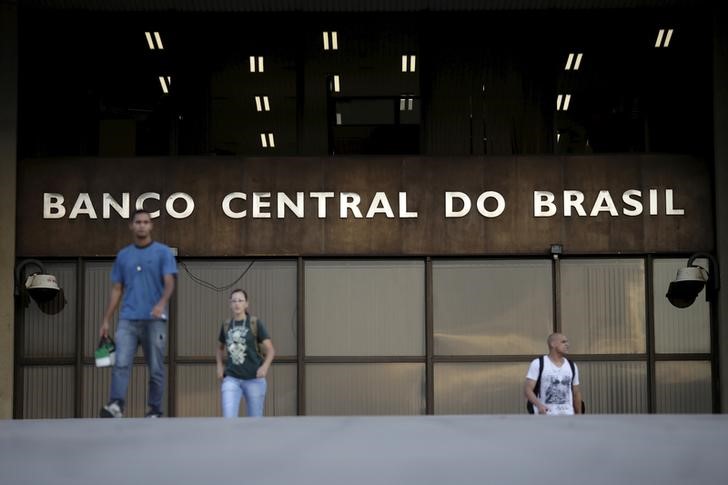By Carolina Mandl and Tatiana Bautzer
SAO PAULO (Reuters) - Brazil's central bank wants to regulate fees retailers must pay when customers swipe debit cards to boost the use of electronic payments and add to already enhanced consumer protections, three people with knowledge of the matter said.
In a Friday meeting at central bank offices in Sao Paulo including representatives of card companies and retailers, the regulator made clear its interest in capping fees that card processors charge retailers, according to two of the sources, who requested anonymity because the matter is not yet public.
Fees paid by retailers in debit card transactions are freely set in Brazil and usually range from 1 percent to 3 percent of transaction value. One source said retailers argued at the meeting that fees average around 0.6 percent of purchase values globally and a few cents per swipe in the United States.
The planned regulations are the latest example of the central bank using its powers as regulator of the financial system to seek consumer protections in an increasingly concentrated banking sector.
Lower transaction costs would also stimulate card penetration - a goal shared by banks, credit card processing firms and retailers seeking to reduce money laundering and violence against clients with cash.
Transactions using credit and debit cards amount to 29 percent of private consumption in Brazil, according to Abecs data, compared to as much as 85 percent in wealthier countries.
A reduction in swipe fees could weigh heavily on the revenue of credit card processing firms such as Cielo SA (SA:CIEL3) and the credit card processing units of Itaú Unibanco Holding SA (SA:ITUB4) and Banco Santander (MC:SAN) Brasil SA (SA:SANB11).
The central bank, Cielo and Santander Brasil declined to comment. Itaú's card processing unit said in a statement that is "favorable to measures to increase card usage in the country."
According to the sources, the central bank sees the cap on rates encouraging card use and lowering prices to consumers, but credit card companies have resisted, arguing that retailers will simply fatten their profit margins if with savings from fees.
During the meeting, central bank representatives said they will work on a regulation over the next few months and review the breakdown of fees among credit card processing firms, banks and payment networks such as Mastercard Inc (N:MA) and Visa Inc (N:V).
In the first nine months of 2017, debit card transactions in Brazil totaled 346 billion reais ($107 billion), according to Abecs, a Brazilian card industry group.
The scrutiny of debit card fees follows new central bank regulations over the past year aimed at protecting consumers from Brazil's towering interest rates.
A year ago, the central bank restricted how long consumers are allowed to use revolving credit lines offered by credit card companies. Average interest rates on those lines fell from 430 percent annually to 220 percent after the regulation, according to central bank data. Debts are now automatically transferred to lower-cost credit lines after one month.
Last week, responding to central bank pressure and months of talks, banks also delivered a proposal to change rules for overdraft credit, also one of the most expensive credit lines in Brazil, averaging 300 percent annual interest rate.
